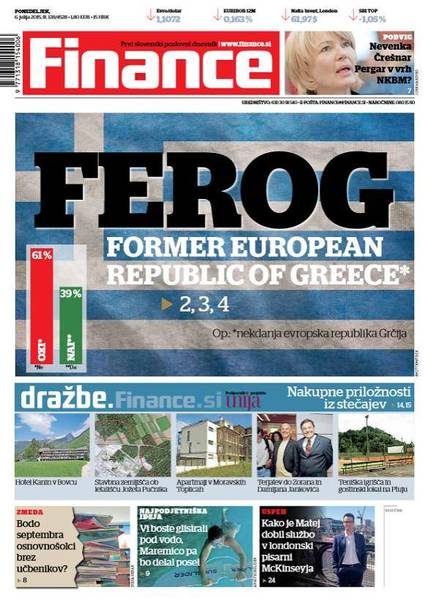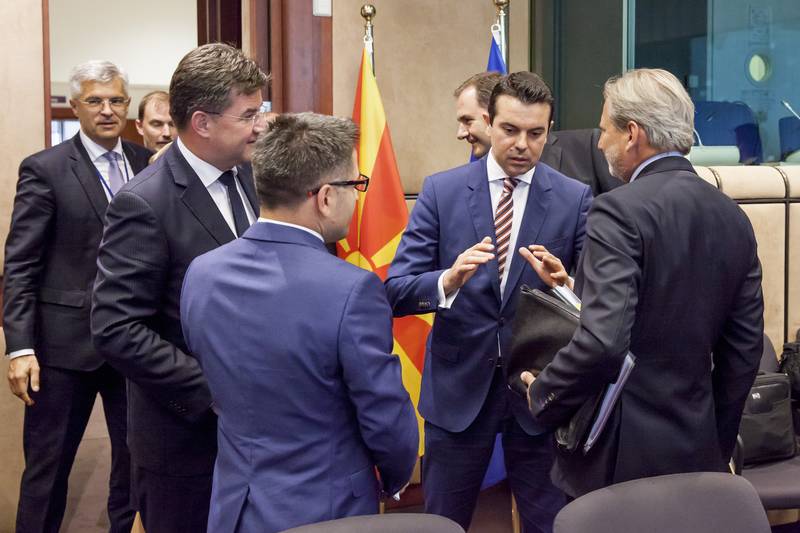A Look on Macedonia and Greece through the Maybach
Adelina Marini, July 22, 2015
 July 15th is a date to remember for Greece and Macedonia. Last Wednesday the European Commission untied the purse strings to help the exhausted from long years of recession Greek economy, thus trying to balance out the wildfire conflict in the Eurozone, provoked by the inability to reach an agreement with the government of the far-left populist Alexis Tsipras. Ten days earlier Slovenian financial daily newspaper Finance came out with a huge first page slogan - FEROG - Former European Republic Of Greece. The headline is a play of words with the official name of Greece’s Northern neighbour – the Former Yugoslav Republic Of Macedonia (FYROM), named so because there is still no agreement between Athens and Skopje on the name of the former Yugoslav republic. The lack of agreement on the name is the reason for Greece, while struggling to stay within the EU and the Eurozone in particular, hinders Macedonia’s accession, despite both countries having a number of similar problems.
July 15th is a date to remember for Greece and Macedonia. Last Wednesday the European Commission untied the purse strings to help the exhausted from long years of recession Greek economy, thus trying to balance out the wildfire conflict in the Eurozone, provoked by the inability to reach an agreement with the government of the far-left populist Alexis Tsipras. Ten days earlier Slovenian financial daily newspaper Finance came out with a huge first page slogan - FEROG - Former European Republic Of Greece. The headline is a play of words with the official name of Greece’s Northern neighbour – the Former Yugoslav Republic Of Macedonia (FYROM), named so because there is still no agreement between Athens and Skopje on the name of the former Yugoslav republic. The lack of agreement on the name is the reason for Greece, while struggling to stay within the EU and the Eurozone in particular, hinders Macedonia’s accession, despite both countries having a number of similar problems.
July 15th is a memorable date for Macedonia as well. It is the day an agreement was reached between the four major political parties in the country with the facilitation of European Commissioner for enlargement negotiations Johannes Hahn (Austria, EPP), the European Parliament’s rapporteur on Macedonia Ivo Vajgl (Slovenia, ALDE), the former rapporteur on Macedonia in the EP Richard Howitt (Great Britain, Socialists and Democrats), and Slovakian MEP Eduard Kukan (EPP). The agreement reached last Wednesday is actually an upgrade with a protocol of the deal, brokered on June 2nd in Skopje, again with the mediation of the European Commission. In the July 2nd agreement the political parties in Macedonia commit to working in the state’s and citizens' best interest, re-confirming Macedonia’s Euro-Atlantic perspective and committing to work in the spirit of the democratic principles of political accountability.
In this agreement political leaders commit to provide for a transition period until free and fair elections are held on April 24th. During the transition period political parties agreed to work on a tight schedule to solve some of the country’s most pressing problems. By June 10th the parties were supposed to come up with a strict organisation for the preliminary elections. The opposition party SDSM committed to coming back to Parliament in autumn, where it is to preside the specially appointed Parliamentary committee for investigation of the wiretapped conversations scandal, which lead to the outbreak of the heaviest political crisis in Macedonia so far. All wire-tapped materials are to be handed to the prosecution. Meanwhile, there needs to be an agreement on carrying through structural reforms, some of which are covered by Chapters of the acquis 23 and 24.
With the July 15th protocol the four major parties bring considerable details to what was agreed a month and a half earlier. SDSM commits to coming back to Parliament on September 1st. A new Minister of Interior is to be appointed on October 20th, nominated by SDSM after consultations with VMRO-DPMNE and the Democratic Union for Integration (DUI). Also on October 20th a new Minister of Labour and Social Affairs is to be appointed, again nominated by SDSM. On the same date a few deputy-ministers are to be appointed. Some are to be nominated by VMRO-DPMNE, others by SDSM (Finances, Agriculture, Information Society and Administration). These deputy-ministers will have full right of veto on any matters related to the organisation of the elections.
The overhauled government must swear in on January 15th 2016, a hundred days before the parliamentary elections on April 24th. The new government will be headed by a Prime Minister, nominated by VMRO-DPMNE. The governing programme of the new cabinet will be limited to elections organisation only. In addition to the governmental reshuffle and preparations for the elections the political parties agree to have a new Special Prosecutor to investigate the interception of communications case.
The EU's reactions were positive. The Chair of the EP’s delegation on Macedonia Alojz Peterle (EPP, Slovenia) commented that the deal created a new political possibility for ending the political crisis and returned the former Yugoslav republic on the road to European integration. Ivo Vajgl, who took part in the mediation efforts, stated that the deal created possibilities for Macedonia to finally starting negotiations. His British colleague Richard Howitt added, that the agreement reached had pulled the country back f rom the brink of the abyss that the country was at due to the prolonged crisis. He finds it extremely important that the Special Prosecutor can work with full autonomy.
rom the brink of the abyss that the country was at due to the prolonged crisis. He finds it extremely important that the Special Prosecutor can work with full autonomy.
A week later the 12th consecutive EU–Former Yugoslav Republic of Macedonia Stabilisation and Association Council held a meeting, presided by Slovakia's Foreign Minister Miroslav Lajčák on behalf of the High Representative of the European Union for Foreign Affairs and Security Policy Federica Mogherini. Alas, Macedonia did not receive what it expected at this Council, namely a commitment for a start of the negotiations process. Foreign Minister Nikola Poposki added to all the rest of the commitments that the agreement included improving relations with neighbouring Greece and Bulgaria. This will be of extreme importance for the negotiations to start, for it will bring back the Macedonians' trust in the process of enlargement. It is namely the negotiations that have crucial importance for keeping the European perspective, explained the Macedonian top diplomat.
Commissioner Hahn only pointed out that there was no time to waste and urged Macedonian institutions to forget about vacation time until they finish the job. Instead of opening the first Chapters, though, on September 18th Mr Hahn will be in Skopje for the renewal of the high level accession dialogue. "The agreement enabled the country to keep the door open for Euro-Atlantic perspective", concluded the Austrian Commissioner. Slovakia's Foreign Minister Mr Lajčák confirmed again his often stated position that member countries should also make an effort. He expressed hope that the July 15th protocol would prove to be a turning point. "We'll be pleased to be part of the successful process of the extension of the enlargement process but it really depends on the countries of the region", he noted.
Regarding the name issue, the EU supports the existing mechanism (through the UN). "We have no ambition to replace this mechanism", said Mr Lajčák and added that the EU was trying to encourage all sides in the negotiation process in putting in maximum effort to reach an agreement. In the findings of the Twelfth meeting of the Stabilisation and Association Council it is only noted that the Council took note of the country's call to open accession negotiations, taking into account the Commission's recommendations to that effect. Last autumn the Commission recommended the start of negotiations with Macedonia for the sixth consecutive time. The country has had a candidate-country status for exactly ten years. It received this status back then together with Croatia, which is already a member of the EU, and Turkey.
While the resolution of the argument over the name of the former Yugoslav republic is expected, political powers in Skopje have another heavy reforms programme to work on, very similar to the one that neighbouring Greece has to deal with. It has to do with implementing rule of law, a reform of the judiciary, media, de-politicisation of public administration, election reform, inter-ethnic relations, and economic governance. Considering all this, the hot subject in social networks and media over the last couple of days has been the photograph of Prime Minister Nikola Gruevski at the beach wearing luxury "Maybach" sunglasses. In the photo you can see that the Macedonian PM is probably wearing the exclusive brand's "Diplomat" model, made of gold and diamonds, costing 60 000 USD, according to Macedonian media. Macedonian news agency МЕТА reported that the government denied the i nformation. According to a statement by the government, the sunglasses are not exclusive and expensive, but quite ordinary, bought at a reasonable price. The Bulgarian public will hardly be surprised that in the information denial the government says that such claims are a part of a media campaign, financed by Soros.
nformation. According to a statement by the government, the sunglasses are not exclusive and expensive, but quite ordinary, bought at a reasonable price. The Bulgarian public will hardly be surprised that in the information denial the government says that such claims are a part of a media campaign, financed by Soros.
The next few months will be especially hot for both Macedonia and Greece. The first will have to prove that it can live up to its commitments, although it is not going to receive anything in return, except a promise for starting negotiations, after the name issue is resolved. The second will receive a third bailout programme for over 80 billion Euros if it fulfils the reforms programme, mapped out with the EU's mediation too. Many of the items in this programme coincide with the Macedonian agenda - de-politicisation of administration, independent media, reform of the judiciary, economic governance. The thing is, for some the negotiation of reforms with Greece is brutal interference in the internal affairs of a sovereign country, while in the case of Macedonia it is perfectly fine. As with many other countries of the region the heightened involvement of Europe is hailed by journalists and citizens both because of the extremely low level of confidence in the national institutions.
Translated by Stanimir Stoev
 Bakir Izetbegovic, Andrej Plenkovic | © Council of the EU
Bakir Izetbegovic, Andrej Plenkovic | © Council of the EU Aleksandar Vucic, Recep Tayyip Erdogan | © Serbian Presidency
Aleksandar Vucic, Recep Tayyip Erdogan | © Serbian Presidency Jean-Claude Juncker, Zoran Zaev | © European Commission
Jean-Claude Juncker, Zoran Zaev | © European Commission